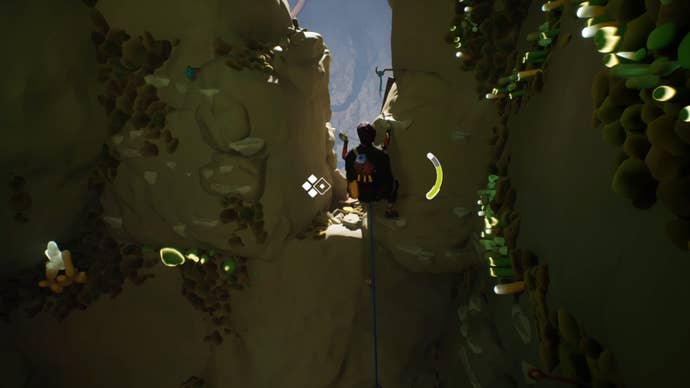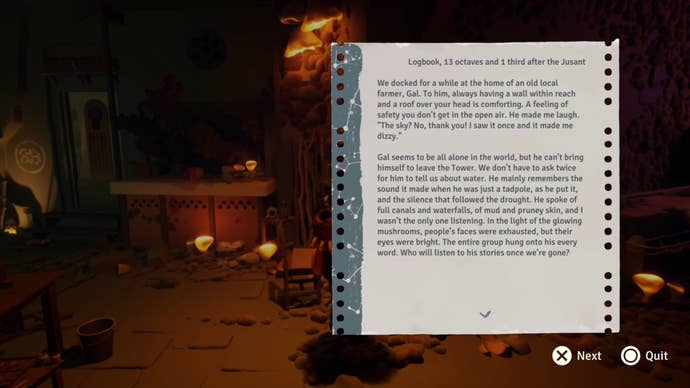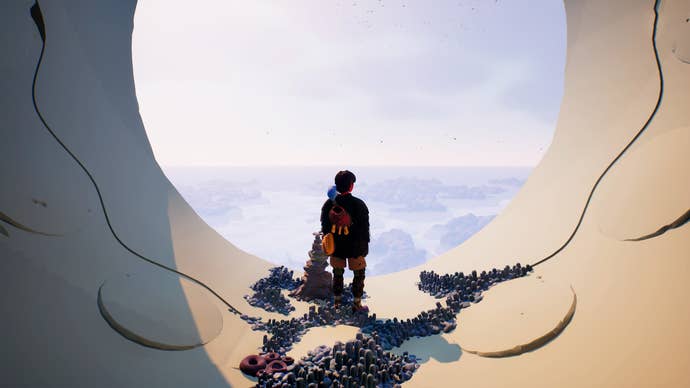Video game climbing is a deceptive affair. Rarely is it the centrepiece gameplay mechanic: often it’s barely more than a one-button means for Nathan Drake to get to the next shooty bit. A traversal mode for getting across Florence or Damascus in a hurry, akin to a car in the sense that you just press the button to turn it on and point it when you want to go. The System takes care of the rest. Yes, I’m being reductive, and dismissive of the fact that Assassin’s Creed, Uncharted, Tomb Raider, and any other Climby Games you’d want to mention usually have a few tricky puzzles where being good at prodding The System is crucial, but games rarely get your palms sweaty searching for the next handhold.
Not so with Jusant. The entire game is centred around finding the next handhold. Figuring out how to scale surface A to reach objective B. It starts off simple: each trigger corresponds to a hand, depressing them makes the hands grip, the left stick moves them around. It’s much more involved than pressing X to fasten Nathan Drake securely to an outcrop, but no less intuitive. And then you go up.
And you keep going up. Because this is The Tower, Jusant’s mammoth location in which the entire game takes place, save for the opening sequence that fades up on a scorching hot former sea bed. The “why” doesn’t take shape until a number of hours later, after you’ve read countless world-building notes left behind in the ruins of The Tower’s quasi-mediterranean civilization. But it’s enough at first to know that, in the spirit of Yazz, the only way is up. Well, sometimes you have to go across a bit. But the trend is skyward.

Your climbing skills will expand as the terrain demands, but not in an RPG-Lite or Zelda sort of sense: the abilities you start with are more or less the same ones that carry you through the rest of the game. Your skill as a player, though, is forced to adapt to a conveyor belt of challenges. Executing double jumps, swinging across vast distances, figuring out how best to be economical with your pins: like few games before it, Jusant really nails the man-vs-nature thrill of scaling a nobbly surface. Nobbles which, in this case, are often moving across the rock on tiny little legs.
Your coordination and timing won’t ever be taxed in the same as, say, Ghostrunner 2 goes out of its way to pummel your senses into a fine mist, but you will find yourself stumped at regular instances for minutes at a time. Enough to feel a constant drip-feed of liquid triumph oozing through your lymphatic system, but not enough that the game is ever frustrating. It’s a masterwork of pacing, offering welcome breaks from long climbing sessions just when you feel like you need one, which let you rummage around in an abandoned series of mountain-side settlements, farms, and mines for world-building flavour text, and the central story of Bianca, an unseen fellow traveller who took this same journey an undetermined amount of time before you got here.
Your passive relationship with Bianca would be the only meaningful one in the game were it not for Ballast, a mysterious, magical water-based creature that lives in your rucksack and helps you along the way with special powers like “showing you where to go” and “making vines grow so you can climb up them”. The latter will remind connoisseurs of Ubisoft’s Grow Home and Grow Up, those micro-games about a wee red robot who has to climb up a bunch of giant plants to get to his spaceship. They’re probably the closest things to Jusant that have previously existed, but they don’t have the polish, the sumptuous art direction, or the compelling writing that has you constantly looking forward to finding the next discarded note or email chain (the Tower people have a sort of analog email system that runs on those post office pods that tills used to get change from, and if that means nothing to you it just means that you’re young and I’m very old).

Usually, I find this type of storytelling obnoxious and dull. Rarely am I moved to sit and read through paragraphs of exposition that have been scattered around by an environment designer, because usually it’s obscenely boring compared to the thing I’m actually there to do (violence, usually). But Jusant’s story threads are, much like the rest of the game, paced and balanced to perfection in the sense that they’re never too long, and never appear with enough frequency that sifting through them feels like a chore. Indeed, you’ll gladly scour every cranny for scraps of prose. It’s here where Don’t Nod’s heritage as a narrative focused studio really shines through: the writing is impeccable, and compelling to the last word.
How the experiences of studious journaler Bianca, and the various other people whose lives you get a small sense of through their throwaway comms, relate to your own struggle up this impossible ziggurat is profound, and very much a tale for our time: a civilisation of people clinging to a doomed world as their crops are ravaged, as their livelihoods are destroyed, and their futures radically altered by an unfolding ecological disaster they are mostly powerless to control or even understand.

But, rather than the usual post-disaster bleakness that video games tend to nuzzle into, Jusant opts for a hopeful note. The people of this world are still raising children, still rolling with the punches, and often taking their fate into their own hands en-masse: there are plenty of tales of travellers venturing out into the vanished sea whose fates we do not learn, but have no reason to assume they were tragic. Well, beyond the fact that there’s no sea. But look, life finds a way.
A way up, in this case. Jusant is another banger in a year of endless bangers, as notable for everything it isn’t as much as what it is: a meditative, evocative odyssey up a big tower, with plenty of time to reflect and ponder deftly weaved through the experience by master storytellers who want you to feel every pore of the rock as you ascend, and every ache of the heart that its residents left behind.
Don’t sleep on this one.
Jusant is available now on PC (Steam), PS5 (version tested), and Xbox Series X|S (also on Game Pass)
 |
Subscribe to Game Pass todayAccess hundreds of great games for Xbox and PC when you become a Game Pass member. Benefits include playing new games on day one, enjoying new game additions each month, plus you can get exclusive member discounts and other free perks. Choose from Xbox Game Pass, PC Game Pass, or a Game Pass Ultimate subscription so that you can play all your favourite games on your console, gaming PC or on your phone, tablet or TV using cloud. Prices start from just £7.99 per month from Microsoft, or you can support our site when you buy Game Pass subscriptions from our eShop. |










Add comment